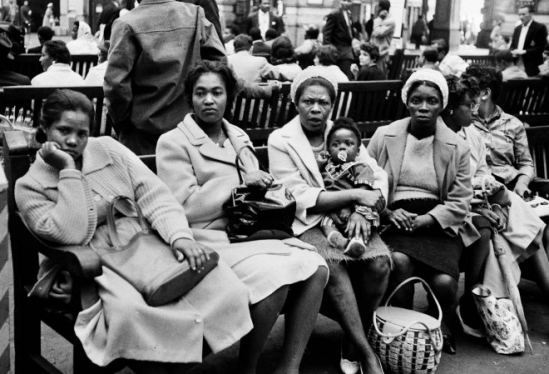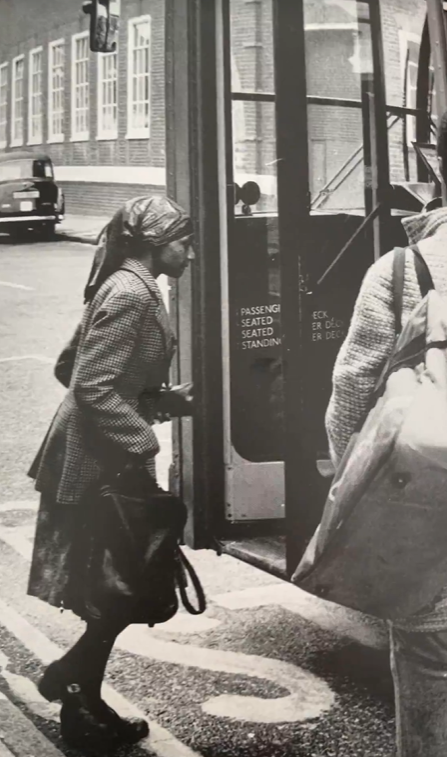Pauline Wiltshire: Family life in England
“If there is love and strength in the home and we give out children an identity they will be better off.” (Wiltshire, 1985:60)
Pauline’s brave decision to move to England was not an easy one to make. However, in the hope she could have a better life not just for herself but for her son, she knew this was the best thing to do. When Pauline first arrived she was greeted by her mother, her new husband and their daughters.
She was driven to her new home in Stoke Newington by her uncle. At first she was excited and looked forward to getting to know them. As time went by however, she was made to feel more of a nuisance rather than a family member.
From the outset, she was left alone due to the family going to work and school. She felt as though she hadn’t been showed her surroundings properly, and was told to stay inside as she might get lost. “I was treated like a child,” Pauline writes. “I first moved in with my mother and stepfather and sisters when I was a woman of 26, with a child of my own back at home” (41). She was made to feel inferior by her family in England, as they would “always talk about me as though I’m not there. I have been in the same room as them, watching telly, and they will talk about me without saying my name but I know its me they are talking about.” (42)

Her relationship with her mother was certainly put under strain due to the new family she had raised in her new life. Her husband (Pauline’s step father) did not warm to Pauline; making her feel uncomfortable and unwanted. “Some step-parents really love their step-children as their own flesh and blood… but some step-parents fail to understand or accept their step-children” (43). Pauline’s step-father was a very strict and religious man, and blamed Pauline for many things within the household. He did not love her as his own. As a result, this caused tension not just between them, but between her and her mother: “Many times she would do things just to please him even if it hurt me” (43).
Pauline speculates on how Jamaican families, in her experience, often neglect their children, causing hugely strained relationships. “Our families are too fragmented and the children do not feel secure. we are too ready to tell our children to leave home when what we should be doing is teaching them the right way to live” (60). In fact, When researching further, it became apparent to me that strained family relationships amongst Caribbean families throughout the was common. Upon finding David Matthews’ Voices of the Windrush Generation, most accounts concluded that family relationships, particularly with older generations, were strained. One account, told by Mother and Daughter Nicey and Jenny, they explained that it “was difficult for children back in those times. Parents were always in control… even in the UK, rules about children didn’t come in until recently, and so i think in the West Indies they had a lot of the Victorian attitudes towards children” (Matthews, 2018:np). The idea of indoctrinated oppression within family unites deriving from slavery could be a possible reason for Pauline’s treatment, alongside many other Jamaican’s like her. (This concept is explored in depth in my previous blog post). This idea of Victorian attitudes in family life could be referred to Emma Griffins work, who set out to explore and experiment on memoir authors’ experiences in the mid to late nineteenth century, finding patterns and changes between writers. Her study was based on 662 autobiographies and found that authors who had turbulent experiences with family members “did not seek to conceal unflattering details of family life, but… did not dwell upon them either” (Griffin, 2014: 18). She found that a “desire to downplay negative experiences is evident amongst those with a more exceptional story of neglect or abuse to tell” (ibid, 20-22), which is precisely what Pauline does when she shares her past family traumas and neglect.

Throughout Pauline’s life she has experiences fragmented and turbulent relationships within her family. Despite her efforts in moving to England to feel a sense of belonging within the family home is lost. That is, with her blood relatives. In response to her lack of love in the family unit, Pauline decided to move out of the family home to a flat where she could finally be at peace. She found comfort and a sense of family elsewhere; within the community she became apart of a local learning centre in Hackney, which held attributes of a family unit for Pauline, and it was at these places where she made many friends and learned useful life skills. She then began volunteering at a health food shop where she stacked shelves, packed and weighed items and helped customers with their shopping. Pauline states she really enjoyed working at the health food shop as “the rest of the staff are very friendly and the manager and his wife are kind and helpful.” (Wiltshire,1985: 48)
Pauline leaves us on a melancholic realisation that the family life she had hoped for didn’t go as smooth as she hoped. However, she found a silver lining amongst the sadness: “It is sad but true, but when I came to England I found greater love outside of my mother and step father and more help and understanding outside of my family. it’s as if my friends have become my family instead” (ibid, 62). It could be said that Pauline utilises her writing as a therapeutic device in dealing with her family troubles. As Scafe concludes, “Black British women’s autobiographies have frequently been enclosed within a biography of a parent: the identities these texts produce are self-consciously dialogic, often involving a recovery and figurative ‘embrace’ of a lost or absent parent” (Scafe, 2016: 150). Pauline is coming to terms with her turbulent relationship with her family, especially her mother, and instead replaces the family unit with alternative people: her friends and carers.
Similarly to Pauline, another author did not have a solid family home to return to. You can read about Natalie Dally’s depiction of Pat O’Mara, and in this blog post she tells us that Pat found comfort in his friends at school rather than with his family.
Bibliography:
Griffin, E. (2014). Liberty’s Dawn: A People’s History of the Industrial Revolution Yale: Yale University Press.
Image 1:
Image 2: Wiltshire, P. (1985). Living and Winning. Hackney: Centerprise
Matthews, D. (2018) London: Blink Publishing. Accessed: 10/4/2020
Scafe, S. (2016). (1945-2010). Ed. Deirdre Osborne. Cambridge: Cambridge University Press, 144-158. Accessed: 10/4/2020.
Wiltshire, P. Living and Winning.1985. Hackney: Centerprise

Leave a Reply